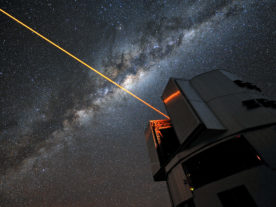
Hot Monster Planet; No Fountain of Youth; Sunscreen Snow on Exoplanet
Hot Monster Planet Found Orbiting Small Star British astronomers say they discovered a “monster” planet orbiting a tiny star, but, according to planet formation theory, the planet should not even exist. The theory suggests a planet of its size could not be formed around such a small star. Located about 600 light years from Earth, […]

Laser Cloaking Device; New Device Spots Exoplanets; Malaria Older Than We Thought
Lasers Could Hide Earth from Aliens Scientists have been scanning the skies and conducting numerous studies in a search for extraterrestrial intelligent life or ETI’s. Back in 2010 renowned theoretical physicist and cosmologist Stephen Hawking warned that it might be too dangerous for humans to interact with ETI’s. While we’re looking for signs of intelligent […]
‘Medieval Warm Period’ May Not Have Been Global Climate Event
Some of those who argue against human causation of climate change often point to a number of Earth’s past climatic events and periods such as the ‘Medieval Warm Period’ and the ‘Little Ice Age’ as examples that climate change can be the result of natural and not necessarily anthropogenic in origin. But now a new study published in the journal ‘Science […]

Phobos May Shatter; Study: Poles Won’t Flip; Webb Space Telescope
Mars May Shatter its Largest Moon Scientists in California have found that the largest moon of Mars, Phobos, is slowly inching closer to Mars. They predict that once the gravity of Mars finally overpowers Phobos, in about 20 to 40 million years, the moon will probably be shredded to bits. The scientists from the University […]
Whirling Black Holes’ Dance to End in Cosmic Blast
Some 3.5 billion light years from Earth, in the Virgo Constellation, there are two black holes (binary black hole), locked by gravity, that are madly orbiting each other. But their orbits are continuing to close in and scientists from Columbia University expect that in about 100,000 years they will join together in one huge cosmic […]

Science Scanner: Monster Galaxy; Mars Missions On Vacation
Monster Galaxy Found Near Edge of Universe A group of researchers imaged a “monstrous galaxy” – SDP.81, located some 11.7 billion light-years from Earth, using the Atacama Large Millimeter/sub-millimeter Array (ALMA) in Chile and a natural magnification method called “gravitational lensing.” The researchers used the gravity of a massive galaxy 3.4 billion light-years away to […]

Science Scanner – A Fish for Your Wounds? US Megadroughts; Help for MRI Stress
“Megadroughts” May Impact Parts of US in the Late 21st Century California has been contending with one of the most severe droughts on record. Now a new study is predicting that in the second-half of our current century, the U.S. Great Plains and the Southwest, including California, will face what could be considered “mega-drought” conditions […]
Real-time Flu Forecasting Proves Successful in Large-scale Test
A flu forecasting system that uses some of the same techniques as modern weather forecasting was not only able to predict the timing of the 2012-2013 influenza season, but was able to do so nine weeks before the flu season peaked. Columbia University researchers say there were able to correctly predict that flu activity in […]
